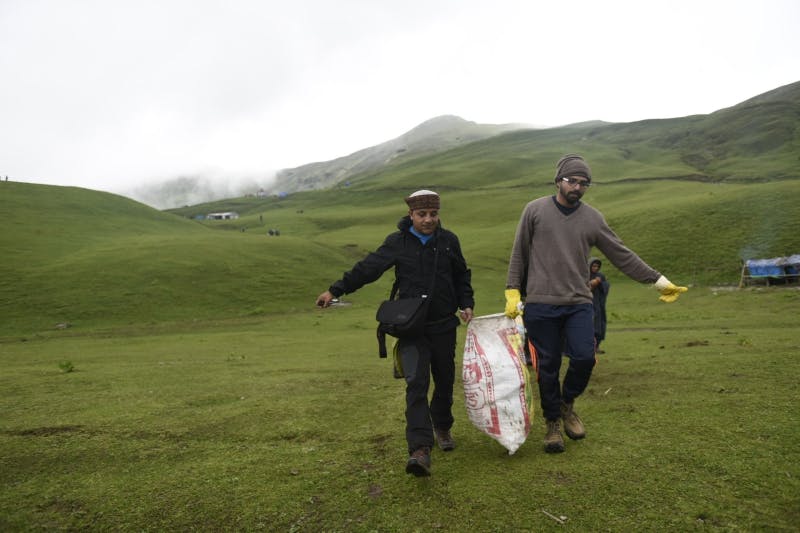9 Ways to Leave No Trace on a Mountain Trail
Share this story
9 Ways to Leave No Trace on a Mountain Trail
Category Green Trails Sustainability Resources About Indiahikes
By Akshay Upreti
2020-04-21
Threat to the environment due to human negligence is a real issue. And our efforts to conserve the mountains is not only a necessity but also a moral obligation. Indiahikes does that under the banner of Green Trails, either by introducing innovative sustainable practices on treks or by implementing sustainable protocols for trekkers and our teams to help them leave no trace in the mountains.
| And there is a lot that you can do as a trekker when you come for your next trek.
But here’s an interesting observation. At the beginning of a trek, there is usually a select few who take the instructions on sustainable trekking seriously. But things change towards the end of the trek.
I remember one particular incident around this.
While coming down from Shea Guru to Chhatru, a popular and crowded campsite of Hampta Pass trek, few trekkers stopped near a hotspot of waste and started collecting it in their eco-bags.
I was expecting them to soon fill their eco-bags and start moving, but to my surprise the rest of the team also joined in.
When their eco-bags were filled, instead of moving on, they started filing sacks found in that litter with trash. By the end of the next 20 minutes, we had 4 sacks full of waste and a much cleaner trail.
This is the power of action.
On that note, here are 9 things you can do to leave the mountains in a better condition than in which you found them.
1. Take your trash back
The mountains do not have an exit for the trash that is already there. You generating and leaving behind your own trash will only worsen the situation. Take your trash back with you to your cities which have systems in place to take care of it.
2. Pick up after yourself
During the trek, you not only not litter, but also pick up trash left behind by others. This might be a lot, especially near popular campsites. Use your eco-bags for this. Then, segregate that waste at the campsites which can be disposed of in a responsible manner.
3. Use the toilets responsibly
Use dry toilets. These are holes dug up in the ground where you can do your business, and then cover it with cocopeat or sawdust.
As the name suggests, no water is used in the toilets and also no peeing. Instead, use toilet paper moistened with water to clean yourself.
Do not use wet wipes. They are a strict no-no because they are not biodegradable at this altitude and temperature. Even if they claim so, they stay behind for years leeching harmful chemicals into the soil.
Also for the ladies, if you are using sanitary napkins, do not dispose them in segregation bags. Instead, a sustainable way of taking care of your sanitary waste is to wrap them in a newspaper, put them in ziplock bags and bring them back with you to the city.
4. Avoid contaminating water sources
Billions rely on Himalayan glaciers for water. Water that flows down from here is used for all sorts of purposes, including drinking.
So keeping them clean is a priority. Wash your utensils, brush your teeth or pee at least 200 meters away from water sources like lakes and streams to avoid contamination.
5. Avoid eating packaged food at dhabas
Plastic wrappers left behind from any packaged food that you consume at dhabas are later burnt by the dhaba owners. Instead, opt for something freshly prepared, like paranthas or omelets.
6. Don’t bring packaged food
Again, plastic packets of chocolates, energy bars, and chips come in are some of the major pollutants in the mountains. If you have one, bring them back to your city in ziplock bags. Better still, don’t bring or consume such packaged products at all in the mountains. This will help you leave no trace.
Remember segregation is only a remedy, not a solution. Reduction is the way forward!
7. Bring eco-friendly products
Carry reusable cutlery with you instead of disposable plates and spoons. This reduces the amount of plastic you have to carry back from the mountains.
Also, to leave no trace, try to bring organic versions of toothpaste and sunscreen with you. Cut down on the harmful chemicals you leave behind in the mountains.
8. Don’t make noise
Wildlife in the mountains is not used to hearing loud human sounds and they can get stressed with the noise you make. We are guests at their home, not the other way round.
Also, you are coming to the mountains for nature and its tranquility. Enjoy that. But if you really like to listen to music, use earphones, that too only at the campsite, not while trekking. Please don’t play loud music on a bluetooth speaker.
9. Keep a positive mindset
The biggest challenge in bringing a change is to overcome the voices of resistance in our own minds. “This won’t make any difference” is the voice of resistance whenever we want to do something new.
In my experience, one trekker’s genuine effort is enough.
I remember a female trekker aged 60+, and her family were the only ones picking up trash in a batch of 20 of mine. And even though they were the only ones, they were so passionate and enthusiastic about it that we ended up bringing 15 kilograms of trash collected during 5 days of trek !
That is the most I have collected in any of my batches and it was just four of them. Imagine how much we can do for the mountains if all of the trekkers like you come together.
But silencing that voice of resistance takes effort. So, here’s a tip – instead of looking for a reason, just bend your head down and start plogging. Everything else will follow.
Conclusion
Look at the 5-6 days of your trek as an opportunity to try something new. Silence the voice of resistance in your mind, make conscious efforts to break apart from your usual habits.
These trekking practices may come back home with you. You may start leaning towards a more sustainable life, something we all need to do, sooner or later.
If you have already been impacted by our Green Trails practices and you are doing something to protect the planet from your home, let us know in the comments section below.
Upcoming Treks
Sign up for our much loved Weekly Mailer
We have terrific trekking tips, trek updates and trek talks to look forward to

